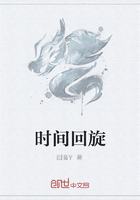ROADS OF DESTINY
I go to seek on many roads What is to be.
True heart and strong, with love to light--Will they not bear me in the fight To order, shun or wield or mould My Destiny?
/Unpublished Poems of David Mignot/.
The song was over.The words were David's; the air, one of the countryside.The company about the inn table applauded heartily, for the young poet paid for the wine.Only the notary, M.Papineau, shook his head a little at the lines, for he was a man of books, and he had not drunk with the rest.
David went out into the village street, where the night air drove the wine vapour from his head.And then he remembered that he and Yvonne had quarrelled that day, and that he had resolved to leave his home that night to seek fame and honour in the great world outside.
"When my poems are on every man's tongue," he told himself, in a fine exhilaration, "she will, perhaps, think of the hard words she spoke this day."
Except the roisterers in the tavern, the village folk were abed.David crept softly into his room in the shed of his father's cottage and made a bundle of his small store of clothing.With this upon a staff, he set his face outward upon the road that ran from Vernoy.
He passed his father's herd of sheep, huddled in their nightly pen--the sheep he herded daily, leaving them to scatter while he wrote verses on scraps of paper.He saw a light yet shining in Yvonne's window, and a weakness shook his purpose of a sudden.Perhaps that light meant that she rued, sleepless, her anger, and that morning might--But, no! His decision was made.Vernoy was no place for him.
Not one soul there could share his thoughts.Out along that road lay his fate and his future.
Three leagues across the dim, moonlit champaign ran the road, straight as a ploughman's furrow.It was believed in the village that the road ran to Paris, at least; and this name the poet whispered often to himself as he walked.Never so far from Vernoy had David travelled before.
THE LEFT BRANCH
/Three leagues, then, the road ran, and turned into a puzzle.It joined with another and a larger road at right angles.David stood, uncertain, for a while, and then took the road to the left./
Upon this more important highway were, imprinted in the dust, wheel tracks left by the recent passage of some vehicle.Some half an hour later these traces were verified by the sight of a ponderous carriage mired in a little brook at the bottom of a steep hill.The driver and postilions were shouting and tugging at the horses' bridles.On the road at one side stood a huge, black-clothed man and a slender lady wrapped in a long, light cloak.
David saw the lack of skill in the efforts of the servants.He quietly assumed control of the work.He directed the outriders to cease their clamour at the horses and to exercise their strength upon the wheels.
The driver alone urged the animals with his familiar voice; David himself heaved a powerful shoulder at the rear of the carriage, and with one harmonious tug the great vehicle rolled up on solid ground.
The outriders climbed to their places.
David stood for a moment upon one foot.The huge gentleman waved a hand."You will enter the carriage," he said, in a voice large, like himself, but smoothed by art and habit.Obedience belonged in the path of such a voice.Brief as was the young poet's hesitation, it was cut shorter still by a renewal of the command.David's foot went to the step.In the darkness he perceived dimly the form of the lady upon the rear seat.He was about to seat himself opposite, when the voice again swayed him to its will."You will sit at the lady's side."
The gentleman swung his great weight to the forward seat.The carriage proceeded up the hill.The lady was shrunk, silent, into her corner.
David could not estimate whether she was old or young, but a delicate, mild perfume from her clothes stirred his poet's fancy to the belief that there was loveliness beneath the mystery.Here was an adventure such as he had often imagined.But as yet he held no key to it, for no word was spoken while he sat with his impenetrable companions.
In an hour's time David perceived through the window that the vehicle traversed the street of some town.Then it stopped in front of a closed and darkened house, and a postilion alighted to hammer impatiently upon the door.A latticed window above flew wide and a nightcapped head popped out.
"Who are ye that disturb honest folk at this time of night? My house is closed.'Tis too late for profitable travellers to be abroad.Cease knocking at my door, and be off."
"Open!" spluttered the postilion, loudly; "open for Monsiegneur the Marquis de Beaupertuys."
"Ah!" cried the voice above."Ten thousand pardons, my lord.I did not know--the hour is so late--at once shall the door be opened, and the house placed at my lord's disposal."
Inside was heard the clink of chain and bar, and the door was flung open.Shivering with chill and apprehension, the landlord of the Silver Flagon stood, half clad, candle in hand, upon the threshold.
David followed the Marquis out of the carriage."Assist the lady," he was ordered.The poet obeyed.He felt her small hand tremble as he guided her descent."Into the house," was the next command.
The room was the long dining-hall of the tavern.A great oak table ran down its length.The huge gentleman seated himself in a chair at the nearer end.The lady sank into another against the wall, with an air of great weariness.David stood, considering how best he might now take his leave and continue upon his way.
"My lord," said the landlord, bowing to the floor, "h-had I ex-
expected this honour, entertainment would have been ready.T-t-there is wine and cold fowl and m-m-maybe--"
"Candles," said the marquis, spreading the fingers of one plump white hand in a gesture he had.
"Y-yes, my lord." He fetched half a dozen candles, lighted them, and set them upon the table.
"If monsieur would, perhaps, deign to taste a certain Burgundy--there is a cask--"
"Candles," said monsieur, spreading his fingers.















